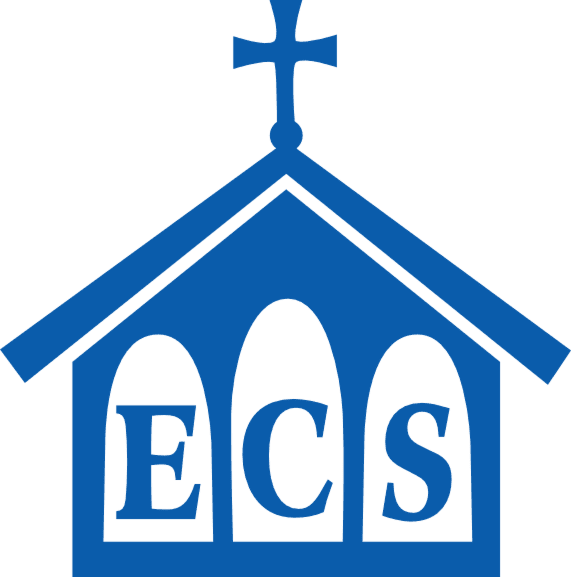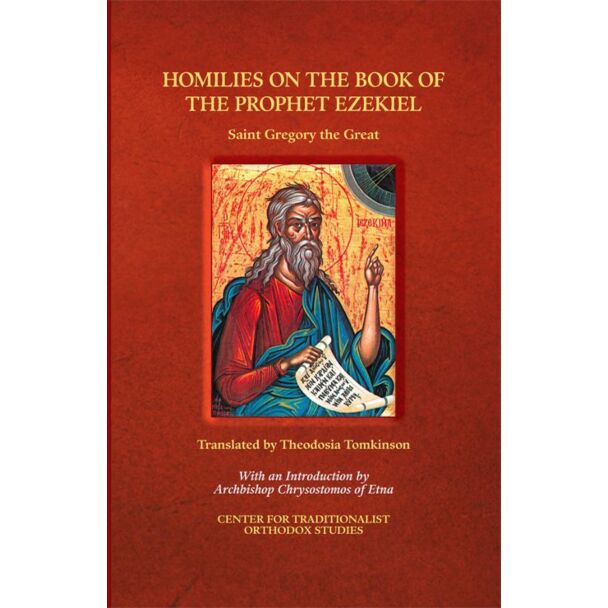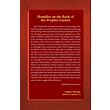Homilies on the Book of the Prophet Ezekiel
by Saint Gregory the Great
Translated by Theodosia Tomkinson
With an Introduction by Archbishop Chrysostomos of Etna
Translated by Theodosia Tomkinson
With an Introduction by Archbishop Chrysostomos of Etna
Publication Data: Etna, CA: Center for Traditionalist Orthodox Studies, 2008
Format: softcover
Number of Pages: 494
Dimensions (l × w × h): 21.3 cm × 13.8 cm × 3.2 cm
Additional Information: black-and-white illustrations
ISBN: 978‒0‒911165‒17‒3
Second Edition
by Saint Gregory the Great
Translated by Theodosia Tomkinson
With an Introduction by Archbishop Chrysostomos of Etna
“Saint Gregory’s homilies on the Book of Ezekiel the Prophet were delivered as sermons to the Christian Faithful at the end of 593, when Rome was actually under siege by the Lombards. There are many references to this in the text, as Saint Gregory bewails Italy’s lost glory and peace. At the time of their composition, he left his sermons in note form, just as the notaries had compiled them, being busy with other cares. Eight years later, at the Brothers’ request, he asked for them, looked them over, and corrected them in preparation for their reproduction in a manuscript that could be conveniently read. The amended text comprised two books, the first of which he dedicated to Bishop Martinian, who had begged Saint Gregory for it at about that time, and the second to the very Brothers who had initially requested it. Prevented by the pressure of many cares, as he himself says, he could not explain the whole of the Book of the Prophet Ezekiel. He expounded only on Chapters 1:1–4:3 (Book One) and Chapter 40 (Book Two).”
—“Preface”
CONTENTS
Introduction
Archbishop Chrysostomos of Etna
Preface
Theodosia Tomkinson
Book One
Preface
First Homily
Before beginning his interpretation of the Book of the Prophet Ezekiel, the Holy Doctor speaks about the tenses and modes of prophecy
Second Homily
The first five verses of the Prophecy of Ezekiel are expounded according to multiple senses, especially the allegorical and the moral
Third Homily
Four verses are expounded, from the sixth through the tenth, concerning holy preachers and their twofold life, the active and the contemplative
Fourth Homily
In the explanation of the tenth, eleventh, and twelfth verses (first part), many moral precepts, especially concerning unceasing concentration on God and attentiveness to oneself, are propounded.
Fifth Homily
In the exposition of three verses, from the twelfth through the fifteenth, there is learned disquisition on the Holy Spirit and His impulse, movement, and indwelling in the Saints.
Sixth Homily
Verses fifteen, sixteen, and seventeen are interpreted, together with the middle part of the eighteenth verse; the meaning of the Prophetic discourse is turned towards the commendation of Holy Scripture, and especially of the Gospel.
Seventh Homily
An exposition of verse eighteen together with the five following verses, and in particular regarding the usefulness of sacred reading and performing acts of charity with such care that we may above all through repentance be attentive to ourselves.
Eighth Homily
An exposition of the remaining verses of the first chapter, starting from verse twenty-four, together with the beginning of the second chapter; and a lengthy disquisition concerning the Divinity of Christ, the Incarnation of the Word, preaching, the gathering, multiplication, and unity of the Church.
Ninth Homily
An explanation of chapter two of Ezekiel; in this explanation not only are many points explained in moral terms, but also much is said with great erudition concerning the necessity of prevenient Grace, the consent and coöperation of our free will, and the obscurity and the interpretation of sacred Scripture.
Tenth Homily
In the exposition of the first verses of chapter three through the fifteenth, the Holy Doctor commends Sacred Scripture, and recommends that it be the object of assiduous reading, meditation, and preaching.
Eleventh Homily
There follows an explanation of chapter three of Ezekiel, from verses fifteen through twenty-eight, in which the pastoral office, the mutually connected sins of prelates and their subordinates, and mental blindness are dealt with in particular.
Twelfth Homily
The Holy Doctor goes through the remainder of chapter three and continues his exposition as far as verse four of chapter four. He adjusts this exposition to various moral precepts or counsels for preachers and their hearers.
Book Two
Preface
First Homily
In an explanation of the first three verses of chapter forty of Ezekiel and of the beginning of the fourth verse, the Holy Doctor deals especially with Christ and the Church, with the elect, and with God’s hidden judgments concerning them.
Second Homily
In expounding two verses of chapter forty, namely the fourth and the fifth, the holy Doctor speaks at length about the active and the contemplative life, interspersing his exposition with a great many moral teachings, as is his wont.
Third Homily
In an exposition of three verses, the edifice of the Church in particular is described as being constructed of all the righteous under each Covenant.
Fourth Homily
In four verses, from the ninth through the twelfth, which are explained allegorically or morally, it is narrated.
Fifth Homily
From the final part of the twelfth verse through the seventeenth the fortieth chapter of Ezekiel is expounded, and the Holy Doctor speaks especially about contemplation.
Sixth Homily
Exactly three verses are interpreted, and it is shown how much perfection shone forth in Christians, and particularly in the Apostles.
Seventh Homily
[In other texts, the nineteenth.] The Holy Doctor expounds seven verses, from twenty through twenty-seven [twenty-six], and at the same time sets forth a great many moral precepts concerning the gifts of the Holy Spirit, the steps leading thereto, true perfection, and the necessity of good deeds.
Eighth Homily
[In other texts, the twentieth.] Verses twenty-seven and the remainder, up and including thirty-eight, are expounded, briefly for the most part, but at greater length in some cases, and in particular the doctrine of the resurrection is set forth.
Ninth Homily
[In other texts, the twenty-first.] Five verses, from thirty-nine through forty-three, are expounded, and with scarcely any attempt to explain the literal sense, the spiritual and moral senses are propounded, and above all the pastoral office is discussed.
Tenth Homily
[In other texts, the twenty-second.] In expounding four verses, from forty-four through forty-eight, the Holy Doctor disserts more freely on faith, hope, love, and the need for offering good works to God in the altar of one’s heart, and concludes this work.
Fragments
First Fragment
On Angels
Second Fragment
On Abraham, Isaac, and Rebecca
Third Fragment
On Moses and the Rod
Fourth Fragment
On Abominations
Fifth Fragment
On a Sheep for an Ass
Sixth Fragment
On Moses and the Dark Cloud
Seventh Fragment
On the Wandering Leprosy
Eighth Fragment
On Aaron Between the Living and the Dead
Ninth Fragment
On a Bird and Her Young
Tenth Fragment
On Wool and Linen
Eleventh Fragment
On the Day of Tribulation
Twelfth Fragment
On the Lord’s Ascent
Thirteenth Fragment
On the Scar of Penitence
Fourteenth Fragment
On the Ships of Tharsis
Fifteenth Fragment
On the Dove of Holy Church
Sixteenth Fragment
On the Precedence of the Ethiopians
Seventeenth Fragment
On the Sons of Ephraim
Eighteenth Fragment
On Strongholds and Terror
Nineteenth Fragment
On Rising Before Light
Format: softcover
Number of Pages: 494
Dimensions (l × w × h): 21.3 cm × 13.8 cm × 3.2 cm
Additional Information: black-and-white illustrations
ISBN: 978‒0‒911165‒17‒3
Second Edition
by Saint Gregory the Great
Translated by Theodosia Tomkinson
With an Introduction by Archbishop Chrysostomos of Etna
“Saint Gregory’s homilies on the Book of Ezekiel the Prophet were delivered as sermons to the Christian Faithful at the end of 593, when Rome was actually under siege by the Lombards. There are many references to this in the text, as Saint Gregory bewails Italy’s lost glory and peace. At the time of their composition, he left his sermons in note form, just as the notaries had compiled them, being busy with other cares. Eight years later, at the Brothers’ request, he asked for them, looked them over, and corrected them in preparation for their reproduction in a manuscript that could be conveniently read. The amended text comprised two books, the first of which he dedicated to Bishop Martinian, who had begged Saint Gregory for it at about that time, and the second to the very Brothers who had initially requested it. Prevented by the pressure of many cares, as he himself says, he could not explain the whole of the Book of the Prophet Ezekiel. He expounded only on Chapters 1:1–4:3 (Book One) and Chapter 40 (Book Two).”
—“Preface”
CONTENTS
Introduction
Archbishop Chrysostomos of Etna
Preface
Theodosia Tomkinson
Book One
Preface
First Homily
Before beginning his interpretation of the Book of the Prophet Ezekiel, the Holy Doctor speaks about the tenses and modes of prophecy
Second Homily
The first five verses of the Prophecy of Ezekiel are expounded according to multiple senses, especially the allegorical and the moral
Third Homily
Four verses are expounded, from the sixth through the tenth, concerning holy preachers and their twofold life, the active and the contemplative
Fourth Homily
In the explanation of the tenth, eleventh, and twelfth verses (first part), many moral precepts, especially concerning unceasing concentration on God and attentiveness to oneself, are propounded.
Fifth Homily
In the exposition of three verses, from the twelfth through the fifteenth, there is learned disquisition on the Holy Spirit and His impulse, movement, and indwelling in the Saints.
Sixth Homily
Verses fifteen, sixteen, and seventeen are interpreted, together with the middle part of the eighteenth verse; the meaning of the Prophetic discourse is turned towards the commendation of Holy Scripture, and especially of the Gospel.
Seventh Homily
An exposition of verse eighteen together with the five following verses, and in particular regarding the usefulness of sacred reading and performing acts of charity with such care that we may above all through repentance be attentive to ourselves.
Eighth Homily
An exposition of the remaining verses of the first chapter, starting from verse twenty-four, together with the beginning of the second chapter; and a lengthy disquisition concerning the Divinity of Christ, the Incarnation of the Word, preaching, the gathering, multiplication, and unity of the Church.
Ninth Homily
An explanation of chapter two of Ezekiel; in this explanation not only are many points explained in moral terms, but also much is said with great erudition concerning the necessity of prevenient Grace, the consent and coöperation of our free will, and the obscurity and the interpretation of sacred Scripture.
Tenth Homily
In the exposition of the first verses of chapter three through the fifteenth, the Holy Doctor commends Sacred Scripture, and recommends that it be the object of assiduous reading, meditation, and preaching.
Eleventh Homily
There follows an explanation of chapter three of Ezekiel, from verses fifteen through twenty-eight, in which the pastoral office, the mutually connected sins of prelates and their subordinates, and mental blindness are dealt with in particular.
Twelfth Homily
The Holy Doctor goes through the remainder of chapter three and continues his exposition as far as verse four of chapter four. He adjusts this exposition to various moral precepts or counsels for preachers and their hearers.
Book Two
Preface
First Homily
In an explanation of the first three verses of chapter forty of Ezekiel and of the beginning of the fourth verse, the Holy Doctor deals especially with Christ and the Church, with the elect, and with God’s hidden judgments concerning them.
Second Homily
In expounding two verses of chapter forty, namely the fourth and the fifth, the holy Doctor speaks at length about the active and the contemplative life, interspersing his exposition with a great many moral teachings, as is his wont.
Third Homily
In an exposition of three verses, the edifice of the Church in particular is described as being constructed of all the righteous under each Covenant.
Fourth Homily
In four verses, from the ninth through the twelfth, which are explained allegorically or morally, it is narrated.
Fifth Homily
From the final part of the twelfth verse through the seventeenth the fortieth chapter of Ezekiel is expounded, and the Holy Doctor speaks especially about contemplation.
Sixth Homily
Exactly three verses are interpreted, and it is shown how much perfection shone forth in Christians, and particularly in the Apostles.
Seventh Homily
[In other texts, the nineteenth.] The Holy Doctor expounds seven verses, from twenty through twenty-seven [twenty-six], and at the same time sets forth a great many moral precepts concerning the gifts of the Holy Spirit, the steps leading thereto, true perfection, and the necessity of good deeds.
Eighth Homily
[In other texts, the twentieth.] Verses twenty-seven and the remainder, up and including thirty-eight, are expounded, briefly for the most part, but at greater length in some cases, and in particular the doctrine of the resurrection is set forth.
Ninth Homily
[In other texts, the twenty-first.] Five verses, from thirty-nine through forty-three, are expounded, and with scarcely any attempt to explain the literal sense, the spiritual and moral senses are propounded, and above all the pastoral office is discussed.
Tenth Homily
[In other texts, the twenty-second.] In expounding four verses, from forty-four through forty-eight, the Holy Doctor disserts more freely on faith, hope, love, and the need for offering good works to God in the altar of one’s heart, and concludes this work.
Fragments
First Fragment
On Angels
Second Fragment
On Abraham, Isaac, and Rebecca
Third Fragment
On Moses and the Rod
Fourth Fragment
On Abominations
Fifth Fragment
On a Sheep for an Ass
Sixth Fragment
On Moses and the Dark Cloud
Seventh Fragment
On the Wandering Leprosy
Eighth Fragment
On Aaron Between the Living and the Dead
Ninth Fragment
On a Bird and Her Young
Tenth Fragment
On Wool and Linen
Eleventh Fragment
On the Day of Tribulation
Twelfth Fragment
On the Lord’s Ascent
Thirteenth Fragment
On the Scar of Penitence
Fourteenth Fragment
On the Ships of Tharsis
Fifteenth Fragment
On the Dove of Holy Church
Sixteenth Fragment
On the Precedence of the Ethiopians
Seventeenth Fragment
On the Sons of Ephraim
Eighteenth Fragment
On Strongholds and Terror
Nineteenth Fragment
On Rising Before Light
Write Your Own Review






